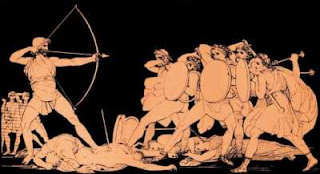“One of the surest ways of being original nowadays, since that is what we are all straining so anxiously after, would be simply to become a well-read man (in the old-fashioned sense of the term), to have a thorough knowledge and imaginative appreciation of what is really worthwhile in the literature of the past. The candidate for the doctor’s degree thinks he can afford to neglect this general reading and reflection in the interests of his own private bit of research.”In today’s academic world, you must find a niche. It won’t do to write generally about revenge in Hamlet or Nature in British Romanticism. To be heard you must be an expert on your subject, and you must find an angle adopted by no one else. Half of your career may be spent in search of this angle, but that’s the cost of a seat in the learned circles. At the end, if you’re lucky, you will be crowned eminent scholar on the feminist echoes in some obscure poem.
In Literature and the American College, Irving Babbitt warns of the dangers of specialization. He distinguishes between assimilation and production. College, he writes, is intended as a time of reflection, during which students assimilate the learning of the ages. Graduate school creates the productive scholar, who contributes his own thoughts and writings. If one skips the reflective stage and enters immediately on graduate-level productivity, “one may shine as a productive scholar, and yet have little or nothing of that humane insight and reflection that can alone give meaning to all subjects” (128).
Since our undergrad situation does not fully emphasize assimilation, Babbitt suggests another degree between undergrad and doctoral—a new degree focused on reading widely. He proposes a program which, through broad and intelligent reading, promotes discipline in ideas. Maybe our Master’s degree would fit this description, but even the M.A. is more research-focused than Babbitt intends. Students should become well-read, as he defines it: “to have a thorough knowledge and imaginative appreciation of what is really worthwhile in the literature of the past.” The proposed program’s instruction would emphasize the “relationship between literature and thought.”
An abrupt transition to grad school, writes Babbitt, “encourages the student to devote the time he still needs for general reading and reflection to straining after a premature ‘originality.’” Entering my senior year, I find myself with a basis in some fields and in certain eras of literature. However, I could use another year or two, at least, to fill in the gaps in economics; the history of ideas; logic and rhetoric; medieval, classical, and French literatures; and literary criticism--to name a few subjects! Of course, I must be selective. I can’t know everything and know it well. But I've often felt that I should read more of the classics before I’m ready to narrow down my interests. What constitutes readiness, though, or should I say “well-read-ness”?
I’m supposed to be looking for graduate programs, but I hesitate to just choose one of the fields I like right now. Maybe I’m using Babbitt as an excuse, but it sure feels like I’m “straining after a premature originality.” My inclination to postpone grad school could spring from a number of motivations, bad and good:
-fear of the unknown
-a valid need to fill in gaps of knowledge
-an irrational desire to be perfect at something before I even begin
-the hope that a path of study will magically unfold with unquestionable lucidity…at a later date
-laziness (have you ever tried to fill out those applications?)
-lack of clarity about the significance of literary study
These uncertainties, and especially that last factor in the list, prompted me to write this blog. And it’s helping—I’m airing concerns and, even better, surveying them in the light of past thinkers like Babbitt. I really don’t think I’ll end up in an obscure, narrow topic in graduate school, because I can choose my course of study. But choosing a preliminary field, and deciding whether to plunge in or delay, are very relevant issues.





